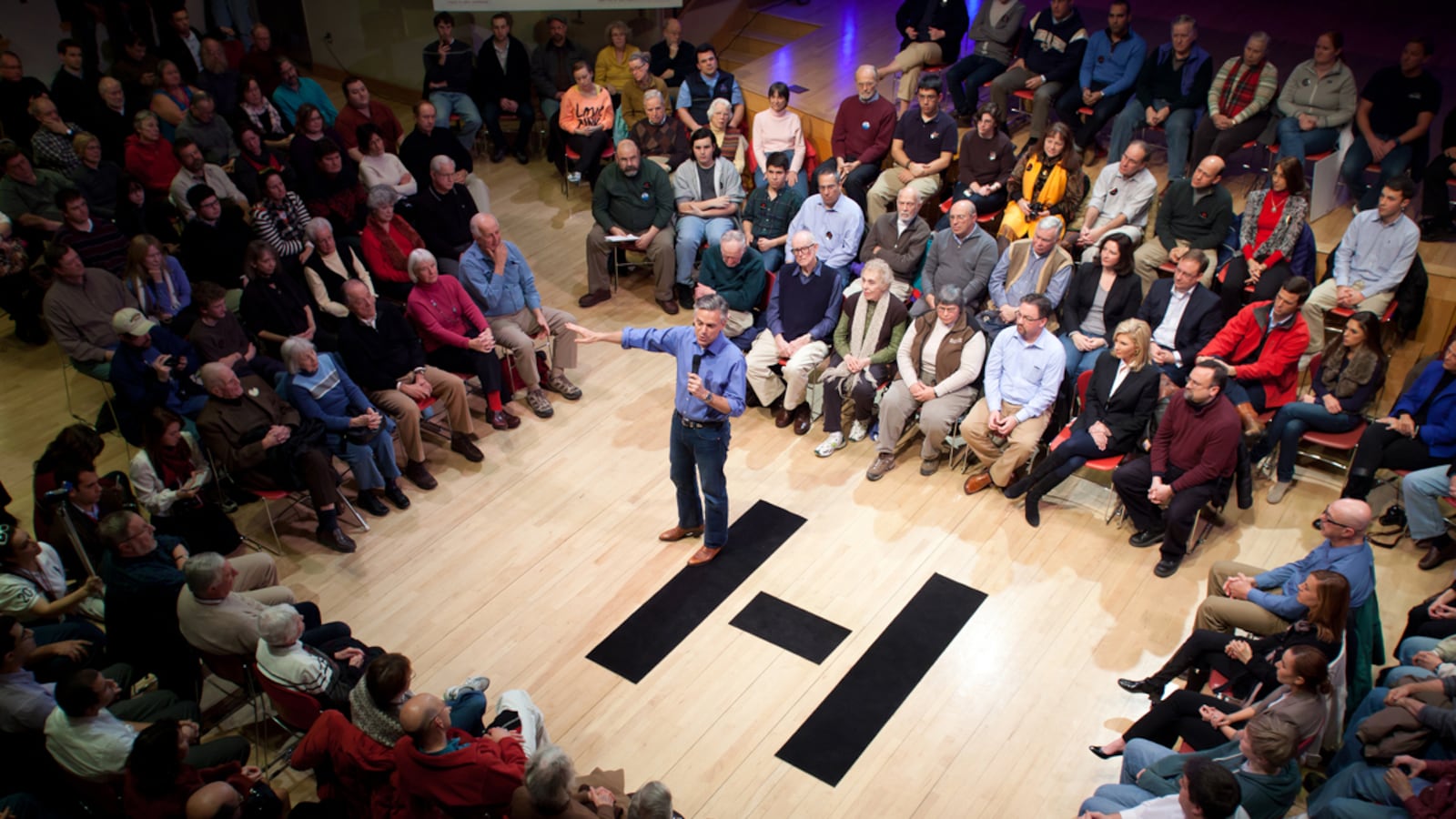MANCHESTER, N.H.—Here’s what you need to know about New Hampshire that keeps frontrunner Mitt Romney on his toes and the other candidates putting in 20-hour days: dreams can come true.
Voters here detest coronations, and they have a very long history of taking contrarian positions in elections.

Just ask Barack Obama, who was leading Hillary Clinton in 2008 by 13 points the day before the primary. He was gliding into rallies like a rock star as thousands of people waited in freezing weather to see him. She was tearing up in a diner, looking like a loser. Pundits were writing her obituary.
Just when it seemed Clinton was finished, New Hampshire gave her a stunning upset victory, throwing the Obama campaign into chaos.
These folks do not want to feel the fix is in. And they don’t pay attention to the horse race.
“I don’t want to be told to vote for a candidate because he’s ahead in the polls—I want to get up close and personal and decide for myself,” says Patrick Bracken, a software engineer, who braved a mob of people jammed into a coffee shop Sunday to hear Jon Huntsman speak.
The most recent public-opinion survey, conducted through Sunday evening by the University of New Hampshire and WMUR, shows that only 44 percent of voters have made up their minds. Romney has a commanding lead with 41 percent, followed by Ron Paul at 17 percent, and Jon Huntsman and Rick Santorum tied at 11 percent.
“It’s wide open for second and third place,” says Andrew Smith, director of polling for the University of New Hampshire. “It's not unusual for 15 to 20 percent of voters to make up their minds on Election Day. We can see a surprise Tuesday.”
In the past 25 years, the state has thrown 11th-hour curveballs to many well-funded frontrunners who were expected to win its primary. Among them: Walter Mondale in 1984, Bill Clinton in 1992, George W. Bush in 2000, Howard Dean in 2004, and Obama.
This year, it’s Romney who’s looking over his shoulder as he approaches Tuesday’s first-in-the-nation primary. While no one is suggesting he will lose, neither is anyone ruling out that one of the other candidates could get too close for comfort.
Stu Stevens, Romney’s longtime media adviser, says the campaign did in fact study what Obama might have done wrong in the final days of the 2008 primary to cause the free fall. They discovered that voters didn’t want to be treated like fans. “Obama wasn’t taking questions. We said, 'We’re not going to do that,'" says Stevens. “So [Romney] always takes questions.”
Over the past couple of days, a least a dozen voters told The Daily Beast that while they liked Romney—and are even leaning toward him—they were still looking. “I’m not sure how I'm going to use my vote yet,” said financial adviser Jennifer Starr coyly, standing on the fringes of an overcrowded barn listening to Santorum.
Santorum and Huntsman need a strong showing to springboard into South Carolina for its Jan. 21 primary—and both say a strong second-place finish is possible. Pollster Smith says Huntsman may have the best chance of surging into second, although he cautions that the former Utah governor seems to be attracting not the Republican base but independents and “undeclared” voters who may not be as committed to turn out Tuesday.
At the beginning of last week, all eyes shifted to Santorum, the conservative from Pennsylvania, who plunged into campaigning fresh from his strong showing in Iowa, where he unexpectedly finished in a virtual tie with Romney for first place. Thousands of people have swamped his events—mostly saying he deserved a second look after working so hard in Iowa.
One was Joyce Lepine, who has been leaning toward Romney. “I wasn’t paying attention to Santorum because he wasn’t getting traction. But after Iowa I felt he deserved a look. I want a president with strong moral values. He seems like he would make decisions. I don’t know if he can win, and that’s what I need to feel comfortable about." Santorum’s fervent hope is that supporters of Newt Gingrich, who has fallen back in the polls, and Michele Bachmann, who has dropped out, might turn to him.
By Saturday, Huntsman became the man to watch.
He spent months in the state—he skipped the Iowa caucuses—attracting small crowds and minimal press. Now he is now drawing mammoth crowds as he surges in the polls and because of strong debate performances over the weekend. On Sunday, 200 people crammed into a small coffee shop, elbowing to hear him. Several said they were impressed by Huntsman’s response during the debates to Romney’s criticism that he had worked for Obama as ambassador to China. “I served my country,” he said.
Later that night, Huntsman had to push his way into a house party in Bedford—where 40 guests had been expected but 250 showed up. Outside, at least 50 media representatives chronicled his every word.
“They say this state loves an underdog,” Huntsman tells cheering crowds. “I am the underdog. There’s not going to be a coronation, folks.”
Music to their ears.






